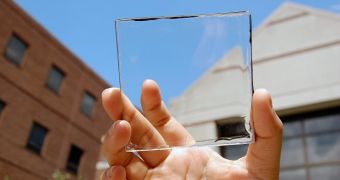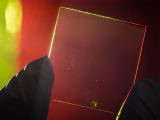The harnessing of solar energy hasn't been going as well as it could have, for a variety of reasons, but it has come to pass that one of the major goals of solar cell research has finally been reached: transparency.
Or at least translucency. You know, when only part of the light spectrum makes it through, coloring the image beyond it, or making it foggy or otherwise unclear.
The problem with integrating solar capturing technology into windows, or anything else using transparent glass, is that you can't really capture solar energy if you just let the light pass through like that.
Researchers at the Michigan State University, however, have figured out a way around the problem, specifically a coating of organic molecules that can distinguish between types of light.
To elaborate, the coating captures the ultraviolet and near-infrared sun rays and essentially pushes them towards the edges of the glass panel, where photovoltaic solar cells lie in wait.
Thus, much of the light we cannot perceive is turned into energy, while the visible one continues on, bathing us and, well, lighting up our lives (and making sure we see where we are going).
The technology is not efficient by any means, at least not yet, since the solar conversion rate is of only 1 percent instead of the 19 percent of other methods.
Before such window solar panels can be put to use, the level of efficiency has to be raised to at least five percent, according to Richard Lunt, a member of the MSU College of Engineering faculty.
Even if the level of sun energy capture never goes above that, it can still prove very useful, since it could greatly reduce a home's need for external power sources, like city power grids. Also, at least during the day, you'd be able to recharge your phone just from what your windows provide.
We are sure that, eventually, every surface on a building, or even the road and other objects, will integrate some sort of solar cell technology. It will be a few decades before that future comes around, though. Maybe more.
In the meantime, researchers will have to perfect methods for keeping solar cells cool, since the hotter they get the lower their efficiency drops. Also, they aren't exactly eternal. They degrade over time, like most everything else.
Not long ago, self-cooling solar cells were invented. This has to be one of the greatest advancements in this field yet. Solar cell windows won't heat as much, since a lot of the light still passes through without stopping, but that may change the more efficient the nano coating becomes.

 14 DAY TRIAL //
14 DAY TRIAL // 

